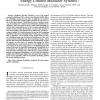Free Online Productivity Tools
i2Speak
i2Symbol
i2OCR
iTex2Img
iWeb2Print
iWeb2Shot
i2Type
iPdf2Split
iPdf2Merge
i2Bopomofo
i2Arabic
i2Style
i2Image
i2PDF
iLatex2Rtf
Sci2ools
111
click to vote
CORR
2010
Springer
2010
Springer
How Much Multiuser Diversity is Required for Energy Limited Multiuser Systems?
Multiuser diversity (MUDiv) is one of the central concepts in multiuser (MU) systems. In particular, MUDiv allows for scheduling among users in order to eliminate the negative effects of unfavorable channel fading conditions of some users on the system performance. Scheduling, however, consumes energy (e.g., for making users' channel state information available to the scheduler). This extra usage of energy, which could potentially be used for data transmission, can be very wasteful, especially if the number of users is large. In this paper, we answer the question of how much MUDiv is required for energy limited MU systems. Focusing on uplink MU wireless systems, we develop MU scheduling algorithms which aim at maximizing the MUDiv gain. Toward this end, we introduce a new realistic energy model which accounts for scheduling energy and describes the distribution of the total energy between scheduling and data transmission stages. Using the fact that such energy distribution can be ...
Related Content
| Added | 09 Dec 2010 |
| Updated | 09 Dec 2010 |
| Type | Journal |
| Year | 2010 |
| Where | CORR |
| Authors | Youngwook Ko, Sergiy A. Vorobyov, Masoud Ardakani |
Comments (0)

